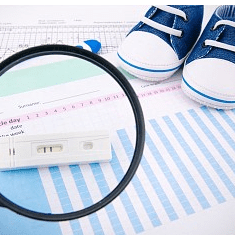Trying to conceive? Studies show that you can impact your body’s ability to get pregnant and have a healthy pregnancy.
1. Get preconception care
Schedule an appointment with your healthcare provider to identify and treat any issues that could affect your pregnancy.
2. Nourish for two
Eating before and during pregnancy is more about quality, not quantity. Eat more highly nutritious foods and decrease foods high in fats and sugars. The foods you eat today are the building blocks for your baby tomorrow.
3. Eat more brain foods
Help your future baby grow a healthy mind with beans, eggs, nuts and seeds, olive oil, Alaskan wild salmon (or any other cold water oily fish), yogurt and kefir, whole grains, spinach, collards, kale, broccoli, prunes, raisins, blueberries, oranges, red bell peppers and tomatoes.
4. Avoid toxic foods
- Avoid fish that are high in mercury, including swordfish, shark, king mackerel and tilefish.
- Skip products with unpasteurized milk—they may carry bacteria that cause a disease called listeriosis, which in pregnancy can cause miscarriage or stillbirth, premature delivery or infection in babies. Make sure the products you buy are marked as pasteurized.
- Avoid hot dogs, deli meats, raw or smoked seafood, raw or undercooked meat—these can also contain the bacteria that causes listeriosis.
- Scrub all of your veggies and fruits—unwashed produce can carry and spread certain disease-causing microscopic organisms.
- Avoid all saturated fats and trans fats; partially hydrogenated oils; added sugars (e.g., high-fructose corn syrup) and refined flour.
5. Take a prenatal vitamin
You should take a prenatal vitamin with at least 400 micrograms of folic acid everyday to prevent the most common birth defects: Spina bifida or anencephaly.
6. Achieve a healthy weight
Being underweight or overweight puts you at risk for a number of pregnancy complications so achieve a healthy weight before you get pregnant. Stabilize for at least 3 to 6 months before trying to conceive at your healthy weight.
7. Learn to relax
Deep breathing, progressive relaxation, mindfulness exercise, and transcendental meditation can all help you relax. A positive mental health and a strong network of social support, including your relationship with your partner, will help you stay resilient through the stresses of pregnancy and parenting.
8. Tune up your immune system
Infection and inflammation pose perhaps the biggest threats to a healthy pregnancy. Reduce saturated and trans fats from your diet, and eat more whole grains, fruits and vegetables that are loaded with antioxidants.
9. Detoxify your environment
“Go green” with as many common household products as possible to avoid potential reproductive and developmental toxic byproducts.
10. Make a family man
Men contribute about half of the baby’s genetic materials. Sperm DNA can get damaged by tobacco, alcohol, drugs, caffeine, diet, medical conditions and environmental toxins. Since men continue to make new sperm, if they take good care of themselves for 3 months, they can replace a lot of the damaged goods with healthy sperm. Encourage your man to see his healthcare provider preconception too.
Start our 10 healthy practices while trying to conceive so when you do get pregnant, your body will be ready for baby.
Related articles









Comments are closed.